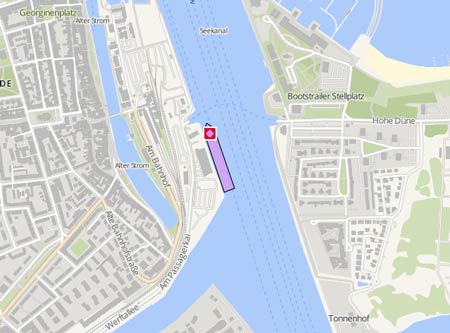DETECTOR
Course/Position
Latest ports
Latest Waypoints
Latest news
Supply ship lost container during cargo operations
An empty 1,3-ton cargo container was being lifted from the "Maersk Detector" to the oil production ship "SeaRose FPSO" on Jan 17, 2016, when it was accidentally dropped, sinking in the ocean. It had become entangled with another container of the same size while being transferred onto the oil production ship in the White Rose Oilfield in the North Atlantic. Cargo operations were immediately suspended and a number of mitigation measures were enacted to manage potential risk to subsea infrastructure. The root cause was under investigation by the operator Husky Energy.
Report on collision with rig published
The Transportation Safety Board has released a report into a collision involving the "Maersk Detector", and the GSF "Grand Banks" off Newfoundland. The vessel struck a support column on board the drilling rig in high seas on Nov 24, 2011. There were no injuries, but repairs to both the rig and the vessel were required. The TSB's findings showed that the bridge officers did not work as a team, and did not make full use of the data available in order to maintain the vessel's distance from the rig. A risk assessment was not performed by the crew, and cargo continued to be loaded, without risk-control measures being put in place. The TSB said because there was no procedure for providing relevant weather information, the vessel and crane operator did not know that the significant wave height limit had been reached and that operations should have been terminated. According to the TSB report Maersk Supply Service Canada has implemented a number of measures including relevant training, stop work triggers, and an updating of voyage data recorder software. Husky has also implemented a number of changes including direct access to the weather service provider's website to ensure continuous up-to-date weather forecasting, and annual third-party competency assessments and training requirements. The C-NLOPB is requesting that the Marine Operations Manual, Safety Case, and Emergency Response Plan for the Grand Banks be updated. Transocean is responding to the request, while the offshore regulator has conducted audits on board both the rig and the vessel.
Both vessels involved in collision stable
The oil well being drilled off Newfoundland by the "Grand Banks" rig has been safely suspended after the "Maersk Detector" struck. Next Husky will decide whether part of the crew of 90 need to come off. A core crew, however, will stay with the rig. It's still not clear how the supplier hit a steel column damaing the stern of the vessel and the drill rig wabove the water. Weather conditions at the time — there were four-to-six-metre seas — will be among the possible factors examined. There were no injuries or environmental damage reported. The rig has a 4x5-metre gash — about 20 per cent of the column's total circumference. There had already been plans to bring the rig back for maintenance in January. That will now be done sooner rather than later, though no more specific time frame was offered. The rig was using water injection to drill an oil well in about 120 metres of water more than 300 kilometres east of St. John's. The rig is owned by international drilling contractor Transocean and was under contract to Husky, which operates the White Rose oilfield.
Upload News

